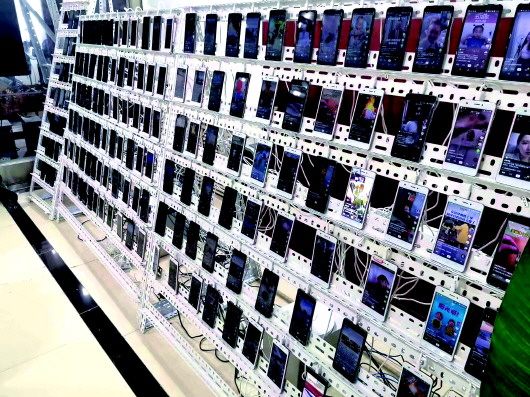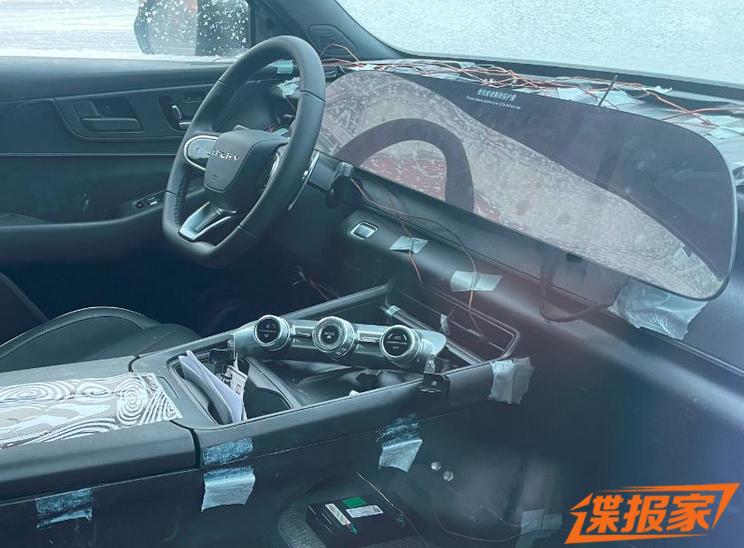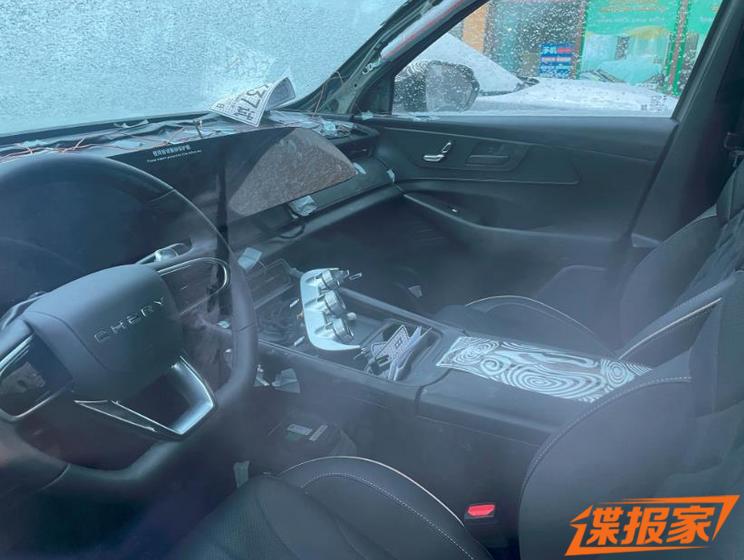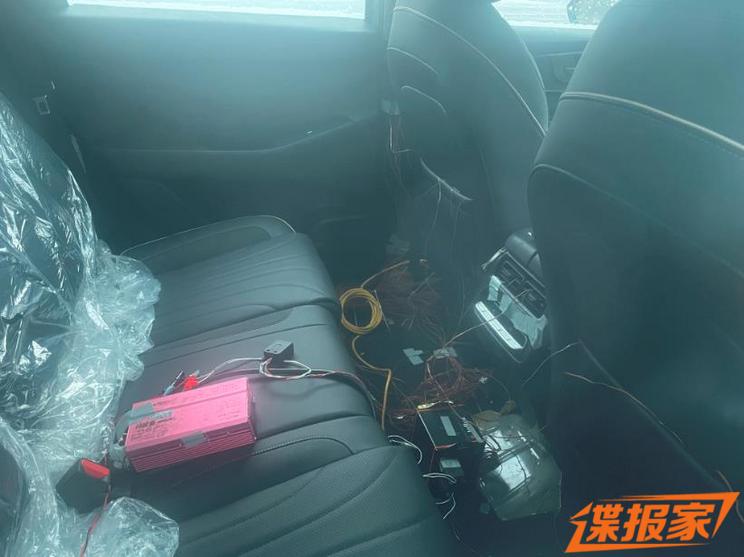
A MCN organization shows the mobile phone matrix of automatic brushing in the front hall. Photo courtesy of respondents
"From the perspective of content, there are too many commercial implants, and I think this is very bad." Chen Xin is still fighting for himself. Because of his inner anxiety, his hands are unconsciously pinching his fingernails.
"As I said before, business cooperation is up to us. Whether I listen to you or you listen to me, you must make it clear!" The other side has a tough attitude and has no intention of giving in.
Weibo V Chen Xin, who has nearly 5 million fans, is a gentle post-90s boy in his life, and often records his beautiful life with his lens. What I just called was an MCN institution that he signed in the summer of 2019.
The two sides have differences on whether the video related to the theme of the epidemic is commercially implanted, and even have to go to court. Chen Xin never imagined that this contract, which was hastily signed last year, would make him so passive and even face millions of yuan in damages for breach of contract.
Born in foreign countries, MCN(Multi-Channel Network), commonly known as online celebrity broker, has grown in China and formed a certain "local characteristics" — — Not only engaged in online celebrity screening and incubation, but also undertake a series of chain work such as content development and management, platform resource docking, commercialization cooperation and realization.
To put it simply, MCN is online celebrity’s "driving force behind the great success". At present, over 90% of online celebrity have signed MCN institutions.
According to the statistics of the Ministry of Commerce, in the first quarter of this year, China’s e-commerce live broadcast exceeded 4 million. The live broadcast of goods grows like wild grass, the sales figures of super online celebrity are common, and the live broadcast experts have become "walking shelves", and MCN institutions with many online celebrity resources are sought after by capital. At the same time, disputes between online celebrity and MCN institutions frequently occur, and MCN institutions are repeatedly exposed with uneven levels and many "pits" in internal water depth.
Is online celebrity’s economy taking off in the wind or a flash in the pan? How many bubbles are there behind a hot mass? How can participants avoid the "pit" to get out of trouble? Xinhua Daily Telegraph reporter conducted an investigation.
It is better to sell aquatic products than to raise online celebrity, and the individual organization runs into the market.
The epidemic has had a huge impact on the film and television industry, and many companies have transformed into MCN. A large number of organizations and individuals run into the stadium, which is related to the low threshold for applying to settle in various live broadcast platforms.
The MCN organization signed by Chen Xin is located in Shenzhen, which was established in 2017 with a registered capital of only several hundred thousand.
According to the data of Sky Eye Survey, there are currently more than 17,000 online celebrity live broadcast related enterprises in China. In terms of geographical distribution, Zhejiang ranks first, followed by Liaoning, Guangdong and Jiangsu.
The COVID-19 epidemic has made by going up one flight of stairs, a popular live broadcast industry. More and more entrepreneurs find the business opportunities hidden in it, and they want to seize the limelight by running into the market.
Statistics show that since March, the number of monthly registrations of live broadcast-related enterprises has hit record highs. It reached 2,877 in May alone, an increase of 684% over the same period in 2019.
"We originally planned to do little seafood, and the factory decoration has been completed by 90%. Now I plan to tear it all down and switch to a media company. " Speaking of his own road to transformation, Brother Cen is particularly proud. Up to now, the first floor of the factory is still storing cold storage and shipping aquatic products, and the upstairs has all been transformed into the office area of the media operation team.
Cenge’s trading company was established in 2008, and it caught the wind of e-commerce, with sales exceeding 20 million yuan that year. But he believes that the bigger the traditional business is, the faster it will die.
"In 2011, I distributed high-end seafood, and the inventory accounted for 50 million yuan, of which 20 million yuan was still a loan. I need to stock up the goods throughout the year in a fishing season. In case you meet a ‘ Black swan ’ The event, the collapse is a moment. " Seeing that peers have closed down under the epidemic, Brother Cen has a lingering fear. "It’s still a good turn for the project ship with light assets."
One person, one mobile phone, the ultra-low cost has given countless people the dream of being a online celebrity, and realizing commercial realization by using these dreams is the new direction of Brother Cen. He has begun to declare that he is the owner of MCN organization with "over 10 million fans".
Brother Cen’s transformation has influenced a friend who originally made a car modification. After the Spring Festival this year, this friend also formed a new media team, and there are also a matrix of more than a dozen accounts.
Among the institutions in transition to MCN, film and television companies are particularly eye-catching. The epidemic has had a huge impact on the film and television industry, and many companies have tried to save themselves, including the transformation to become MCN. In addition, industry leaders such as Huayi Brothers and Wanda Media have also increased their MCN business.
Li Xiang is a post-80 s film and television industry practitioner. He didn’t start work in the first four months of this year. A video released in May became popular, which attracted him a 60,000-yuan advertising order. He said, "Many companies and film and television bases can’t start work this year. In contrast, MCN’s business is more stable." For film and television companies, MCN is more like an extension of business, which has accumulated in content production and artist training.
In addition to the film and television industry, there are a large number of educational institutions that have transformed into MCN. Different from strong entertainment projects such as games and chats, the core value of educational content lies in the effect. High-quality content will establish a strong trust relationship with fans and further realize the realization of C-end business. As early as 2017, Weibo Education, a subsidiary of Sina, launched the MCN cooperation program, with nearly 100 cooperative institutions, covering various fields such as postgraduate entrance examination, CET-4 and CET-6, civil servants, department examination and studying abroad.
Since the beginning of this year, Yu Minhong, Chairman of New Oriental Education Technology Group, has also given many live lectures on platforms such as Aauto Quicker and Tik Tok. According to the statistics of iResearch, the total turnover of educational products sold through short video platforms in 2019 reached 11.75 billion yuan.
At present, Aauto Quicker, Tik Tok, bilibili and other platforms have launched cooperation plans with educational institutions. In November last year, Aauto Quicker announced that it would take out 6.66 billion traffic to help start educational accounts; In February of this year, Tik Tok’s Byte Department short video joint education and training institutions and public schools launched the "home class" project; In February this year, bilibili launched the "Non-stop Learning" course to provide flow support and cash rewards for UP owners.
People from all walks of life are pouring in. According to Tianyancha data, as of July 6, according to the industrial and commercial registration, there are 9,284 new live broadcast related enterprises in China this year, which has exceeded the number of such enterprises added in the whole year of 2019.
A large number of institutions and individuals run into the stadium, which is related to the low threshold for applying to settle in various live broadcast platforms. To become a resident of MCN in Aauto Quicker, you only need to submit three original signed authors, one of whom has more than 2,000 fans, and the author has updated more than three works within two months; To become an MCN organization in Tik Tok, you only need to sign five live broadcasters under the company’s banner, and the total number of fans will exceed 10,000.
Batch incubation becomes easier, but it is more and more difficult to realize it.
The Matthew effect of the industry is becoming more and more obvious. All kinds of resources are tilted to the head of several large companies, and it is increasingly difficult for small and medium-sized institutions to make money. "It seems to be ‘ Blue Ocean ’ The market, in fact, has ‘ Red to black ’ "
"The so-called online celebrity, to put it bluntly, is just a matter." Kai Ge, an employee of MCN in Beijing, bluntly said, "It is to build ‘ People set up ’ It is different from ordinary people, and netizens like to watch different content. "
In the fast-paced era, a short video of 15 seconds, if the first 3 seconds are not attractive enough, users will take it away. "We speak ‘ Three seconds is life and death, and seven seconds is a turning point ’ Law, what is needed is the sense of contrast of strong visual impact. Pursuit makes people sigh involuntarily after reading it ‘ I’ll go ’ !” Brother Kay said.
He takes Chen Yufu, an online celebrity who shows off his wealth, as an example. Every day, he wears 26 kilograms of gold to go out. Under a big gold chain with a diameter comparable to that of walnuts, he hangs a gold medal the size of a brick, glittering from head to toe. Such a high-profile and luxurious dress has attracted Chen Yufu’s attention and even attracted police investigation. In fact, all the gold worn by Chen Yufu is fake.
"The words and deeds that are out of place really catch the eye, but it is easy to roll over if you don’t grasp it well." Brother Kai knew online celebrity, who was set up by an elite, and rented a mansion of hundreds of millions of yuan to shoot videos. As a result, keen netizens found out that this house had appeared in many people’s videos.
Sensory stimulation is the primary way to absorb powder, and the platform also knows this. For example, if you register as a new user in Tik Tok or Aauto Quicker, the system will automatically push eye-catching content. First, catch the user staying on the platform, and then push the content according to the user’s viewing habits.
"Big data will not deceive people. What do you like to watch? It is clearer than your mother." Brother Kai said half jokingly, "There is an indicator called ‘ The broadcast completion rate ’ Even if the user doesn’t comment, like or collect, but a video is not finished, it can’t be faked. When the platform algorithm knows that you love watching this kind of video, it will be easier for you to brush the same type of work. "
In the face of massive choices, netizens are prone to aesthetic fatigue. Therefore, if you want to capture users for a long time, you have to rely on excellent content.
Kai Ge said that before incubating online celebrity, they first examined the character and personality to avoid the collapse caused by too many negative news; Secondly, look at the external and internal advantages or characteristics. Externally, such as height and face value, can people remember instantly? Internally, it refers to knowledge and experience, or whether they have mastered a skill. "Don’t force both inside and outside, just have one specialty."
Do a good job of positioning and shooting a good video, but what if it still doesn’t work? There is still a way.
"20,000 plays +150 live likes +30 forwards +15 live comments, just 28 yuan!" The reporter contacted Wechat business, a Tik Tok promoter, randomly selected a short video with vibrato, and bought this 28 yuan package online. Sure enough, the promised effect was fulfilled within the scheduled time.
The Wechat business also received the "popularity in the live broadcast room" business: "5 real people interact for one hour" charges 50 yuan, "10 robots brush for 3 hours" charges 40 yuan … …
298 yuan is the quotation of the brushing system he recommended to reporters. "It only needs a mobile phone to run, and then you can take orders yourself, or you can sell this system and continue to recruit agents." The Wechat business also revealed that many institutions are also using this system, "saving money for personal use and making money by helping others brush."
There is also a video mass production system, which can manage hundreds of accounts by one person, but the cost is high: the system supporting 32 mobile phones costs 19,200 yuan, the system supporting 96 mobile phones costs 38,400 yuan, and the maintenance cost is 3,000 yuan per year in the later period. This is only the software part, and the hardware mobile phone and SIM card have to be purchased by themselves.
After thoroughly studying the platform algorithm, user psychology and powder-increasing channels, it is no longer difficult to mass-produce online celebrity. The reporter interviewed a number of MCN institutions, without exception, the office area has two walls. One wall is covered with photos of its online celebrity, called "online celebrity Matrix", which is convenient for merchants who come to negotiate business to choose; A wall is covered with mobile phones to show the power of the brush system.
At present, there are three ways to change online celebrity: advertising, bringing goods and rewarding. The specific division depends on the contract, and the bargaining power of different people is different. The most common one is the three-seven-open, and the institution takes seven.
Some people envy online celebrity for getting "hundreds of millions of sound waves" in one night’s live broadcast. According to the rules, it is tens of millions of yuan. "But none of the hundreds of millions of sound waves are brushed up by bits and pieces, and there are institutions behind them. It is impossible for all the money to go to the anchor, but if the anchor has a good ranking, it can improve the bargaining power. " Brother Kai borrowed a line from the movie to describe it, "The money of the gentry is returned in full, and the money of the people is divided into three or seven parts."
The reporter’s investigation found that a standard team in online celebrity should consist of at least six people: a clothing supervisor, a designer, an assistant, a make-up, a cameraman and a new media operator. After one year, at least one million yuan needs to be invested, and it may not be realized. Therefore, the current MCN institutions have been much more cautious when incubating online celebrity.
In addition, the Matthew effect of this industry is becoming more and more obvious, and all kinds of resources are tilted towards online celebrity, the head of several large companies, making it more and more difficult for many small and medium-sized institutions to make money. Brother Kai thinks that the market that individuals seem to be "blue ocean" is actually "red and black".
"Juicer scam", bragging cost is a PPT.
"It is very common to spread the net to hoard the author by painting a pie with empty gloves. It is possible not only for pheasant MCN company, but also for large and medium-sized MCN, but the probability of the former is higher."
At present, most MCN organizations adopt the strategy of "casting a wide net", looking for "Xiaobai" who has certain creative ability and a small number of fans but has potential for growth. They try their best to sign up for their own companies and get as many as they can.
After recruiting, they are basically free-range, and whether they can be popular depends on nature. If you are red, you will earn, and if you are not red, you will lose.
When signing "Xiaobai", institutions will boast about how they have channels, strength and matrix, and how many online celebrity are hatched by themselves. After all, it is not easy to verify, and the cost of bragging is a PPT.
This is the case with the MCN organization that Chen Xin met. "At that time, several institutions wanted to sign a contract with me, but this institution was more active and spoke very well."
He signed the contract without a field trip. "This institution was in Shenzhen, and the contract was signed directly online. Now I have to go to court, I have never even seen their faces. "
Chen Xin recalled that after signing the contract in April last year, the other party seemed to disappear. All his videos are planned, scripted, copied, filmed, edited and subtitled by himself. Just after he rose to 1 million, the boss of this organization suddenly appeared in the WeChat group chat, and began to evaluate Chen Xin’s unprofessional video production. Then he turned the topic to the business list and asked Chen Xin to advertise and implant, and the commission was divided into three or seven parts.
During the epidemic this year, it was very risky to go out and run around. The company didn’t provide any protective measures, only saying "You should pay attention to safety", which made Chen Xin feel very chilling. On the other hand, if he makes money from this blog, he feels that it is tantamount to "eating human blood steamed bread", which is the reason for his real inner resistance.
In the face of Chen Xin’s refusal, the company took out the contract at that time. To put it bluntly, "the liquidated damages can’t be less, and the highest value is 3 million."
Chen Xin, a little desperate, even thought of giving up making short videos. After calming down, he wanted to find a job, or go to school again, and dragged this matter to the epidemic by the word "drag", which was also rejected by the company.
There are not a few people like Chen Xin. Zhou Ling, a 90-year-old designer in Shanghai, is ready to fight a lawsuit for three years. Her father carried these jobs for her. "It is particularly distressing to see my father in his fifties driving from Shanghai to Hangzhou with his luggage again and again."
For many online celebrity or bloggers, if they want to take the road of commercialization, MCN can hardly avoid it. Like Chen Xin, he only has experience in making content, but he doesn’t know anything about business cooperation and signing contracts, so he needs the assistance of MCN.
"It is very common to draw a big cake with empty gloves, not only pheasant MCN company, but also large and medium-sized MCN, but the former is more likely." Brother Kay is not surprised by this situation.
Huang Han, another slightly experienced bilibili UP owner, is much more cautious about the contract. He described it to reporters as a "juicer scam". In April this year, Huang Han was invited to talk to the MCN company that wanted to sign him. "In a Zhongchuang Industrial Park, the scale is very small, that is, two offices were rented."
The basic content of the contract, Huang Han has no salary, he is responsible for making the video and bears the cost of the video himself, earning 37 points, and the video copyright belongs to the company.
The organization does not give nothing, but will give a so-called operation teacher, who is responsible for "monitoring and analyzing data and observing hot trends on the Internet". To put it bluntly, it is to look at the background data and then brush the hot search every day.
"This kind of operation teacher is usually a female college student who just graduated, and it is not one-on-one. At least it will be a teacher of twenty or thirty bloggers." Looking at these terms, Huang Han felt that if he signed it, he would send himself into the juicer and then respectfully send it to others.
What content creators need most is traffic, which is also the biggest help that organizations can give. When Huang Han asked what resources could be provided, the person in charge of the organization began to talk about him, talking about vision and the future, but not about resources.
Then the person in charge of the organization also talked about the reward mechanism: once the contract is signed, Huang Han can introduce other bloggers to sign the contract, so he can take 15% from the blogger’s income, and Huang Han can get 15% from the bloggers who introduce the contract later.
As an adult, he rationally controlled his emotions, but he just exclaimed: "Wow, you can introduce the concept of pyramid selling into MCN format, which is also an innovation!"
"bonus hunter gave other sheep from us, so what happened to you?" Since then, Huang Han has not considered cooperation with MCN institutions.
Online celebrity’s training courses are hot, and there is no shortage of leeks and knives
Inspired by getting rich overnight, many people flocked to this outlet. Because incubating online celebrity burns money and consumes energy, some people in the industry are eyeing online celebrity training courses.
Any industry is hot, and when cutting leeks, the sickle is the sharpest.
The first wave of cutting leeks: earning tuition.
Inspired by all kinds of grassroots who get rich overnight, many people have poured into this outlet. However, because incubating online celebrity consumes energy and money, some people in the industry are eyeing the training courses in online celebrity.
"Ten years ago, you missed Taobao. Five years ago, you missed Wechat business. You must not miss the 2020 short-sighted frequency band. If you want to realize short-sighted frequency band goods, contact us to provide you with one-stop professional services. Zero foundation, zero fans, no traffic, no source of goods, no team, can also quickly become a master of goods … …”
The reporter left contact information behind this short video. The next day, he received a phone call from the MCN organization in Shenzhen, saying that adding WeChat can learn short video creation.
After the reporter added the WeChat of the course consultant, he could receive the live course links at 3 pm and 8 pm every day. The identity of the speaker is either the dean or the founder. The opening remarks always say that he is very busy at ordinary times. "That is, I have time to give lectures to you today, and all the students who come to attend classes today have earned it!"
The content of the course is all kinds of cases of becoming popular and getting rich. This account has realized 100,000 yuan in three months, and that account has achieved 500,000 fans in one month. From time to time, it "stimulates" the audience with the voice of chicken blood: "All the resources are given to you. Can you make money? Students who can type on the screen ‘ Neng ’ Give me the word! "
The one-and-a-half-hour course, in the last half hour, began to get down to business and urged the order: "I only accept five disciples today!" These five people can accept my personal guidance and enjoy today’s preferential price of 3980 yuan. After today, even with the help of ordinary teachers, the price will return to 5980 yuan. There is still the last half hour, and there are not many places! "
At the same time, the course consultant will keep urging, "What are you hesitating about? Such an opportunity is only available today. " Many netizens reported that they didn’t respond after paying the money, vowed to collect the money, and turned their heads silently.
The second wave of cutting leeks: earning kickbacks.
There is another organization that promises to "take you to fly", which seems to be more reliable. For example, promise to build your personal account to 100,000 fans in one month. If it is not up to standard, it will be refunded in full, and the entry of company transfer will be added, which seems to increase a lot of credibility.
However, after the establishment of personnel, the contractors will be provided with various talented teachers and training courses on the grounds of upgrading their skills. The expenses will be borne by individuals, and the institutions will be busy earning kickbacks and commissions. There are also institutions that love to sign female anchors. After signing, they say, "You have a disharmony in an organ on your face, so you need to have a cosmetic surgery", and then recommend a cooperative beauty agency, and the cost of the surgery will be borne by yourself.
The third wave of cutting leeks: earning spreads.
Some MCN organizations use the "shell" of the contract with goods to do the business of "interest-free storage". The merchant signed a contract with MCN to bring the goods, and the merchant paid a service fee of 300,000 yuan and signed a three-month contract to bring the goods. MCN promises a full refund without commission if it fails to meet expectations within three months. When the merchant heard it, it was "very cost-effective", but by the time the contract was fulfilled for one month, there was no sales of the goods at all. The merchant wants a refund, but the contract has not expired, so he can only wait. At the expiration of three months, the MCN organization will definitely return the money to the merchant, and during this period, he will not sell any goods.
According to industry analysts, this MCN organization may have signed dozens or hundreds of similar contracts. Calculated by 10 copies, this fund deposit is 3 million yuan. He won’t really bring you goods, but will only use the merchant’s money to invest and earn interest. If the money he invested has not come back in three months, he will use the re-signed contract to pay back the money of the top 10 companies.
Recently, the Ministry of Human Resources and Social Security officially released nine new jobs, including "Internet Marketer", including "Live Salesman". For those who want to enter the business, Brother Kai suggested thinking clearly about two questions: "First, who am I, and what does the other party want to package me?" Second, who they are, what qualifications they have, and why they have the ability to package me. " And we must choose a big company with credibility to cooperate with, and don’t sign a contract by imagination.
Since February this year, many local officials, academicians, university professors, etc. have organized groups to carry out "live broadcast to help farmers" activities on the Pinduoduo platform. Mao Yufeng, who is in charge of docking activities, told reporters that in Pinduoduo’s live consumption poverty alleviation model, there is no MCN agency as a middleman, and these goods-carrying groups are also "voluntary labor", with no "pit fees" and no commission. This is a relatively simple model in several platforms.
Because the industrial chain is complex, network anchors, content publishing platforms, product suppliers and other related participants lack clear management standards and supervision mechanisms. Faced with the irregular phenomenon in the early stage of industry development, China Business Federation issued a notice, asking its subordinate media shopping professional committee to take the lead in drafting and formulating two standards, namely, Basic Standards for Operation and Service of Video Live Shopping and Evaluation Guide for Online Shopping Credit Service System. This will be the first national standard in the industry.
The formulation and implementation of the two standards will help to guide and standardize the development direction of China’s live shopping and online shopping industries, put an end to chaos in the live broadcasting industry, reshape the industry ecology, improve the technical management level of the new retail industry, and safeguard the interests of consumers.
Hu Xianzhi, a doctoral supervisor in the Public Administration Department of the Central Party School (National School of Administration), suggested that the regulatory authorities should gradually improve the compliance requirements for this industry and help the industry develop healthily. MCN institutions should actively respond to the requirements of national laws and government regulatory agencies in terms of qualification filing, content compliance, live broadcast delivery compliance and intellectual property compliance, so as to develop healthily and in the long run.
(Xinhua Daily Telegraph reporter Liu Yuyu Some of the interviewees are pseudonyms)






































